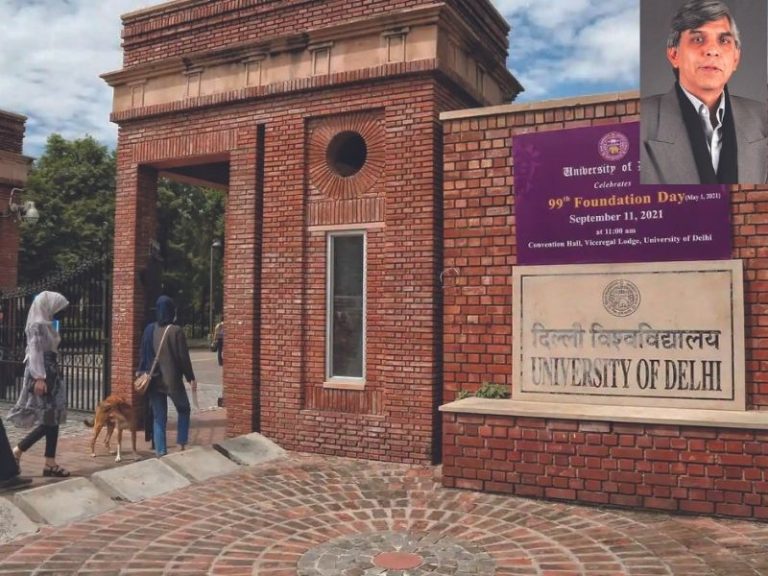No products in the cart.
Delhi: FYUP resurrected

Delhi University: full circle. Inset: Dinesh Singh
The wheel is set to turn full circle for Delhi University (DU, estb.1922), one of India’s largest (82 affiliated colleges and 400,000 students) and most popular universities. In 2013, DU became the first university to introduce four-year arts, science and commerce undergrad programmes.
Reacting to widespread reports about industry’s dissatisfaction with arts, science and commerce graduates from Indian universities — including the top-ranked Delhi University — in 2012, DU’s visionary and hard-driving vice chancellor and renowned mathematician Prof. Dinesh Singh persuaded Kapil Sibal, then Union minister for education and the University Grants Commission (UGC) to permit DU to introduce a four-year undergraduate programme (FYUP).
Predictably this overdue reform, which added a year to the three-year degree programme introduced during the British Raj, generated a storm of controversy. In its manifesto in the run-up to General Election 2014, the BJP, egged on by the Akhil Bharatiya Vidyarthi Parishad (ABVP), promised to abrogate the university’s FYUP if elected to office at the Centre. With the BJP sweeping General Election 2014 with a two-thirds majority in the Lok Sabha, in a brazen volte face, UGC withdrew its permission to DU which had already introduced FYUP in its affiliated colleges in the academic year 2013-14.
Although DU’s four-year undergrad programme was promptly and cravenly withdrawn by UGC under pressure from bossy Union HRD (education) minister Smriti Irani, informed educationists were almost unanimous that it was an overdue reform. The T.N. Subramanian Committee constituted in 2016 to draft the National Education Policy endorsed it. Ditto the K. Kasturirangan Committee which was appointed in 2018 after the Subramanian Committee’s report, which recommended sharp reduction of government control of education, was rejected.
The KR Committee Report’s strong recommendation of FYUP for all universities countrywide was incorporated into NEP 2020 presented to Parliament and the nation on July 29, 2020. But with the novel Coronavirus pandemic having broken out three months previously, its implementation has been slow.
Consequently, UGC has formulated the National Higher Education Qualifications Framework (NHEQF) under which the duration of all arts, science and commerce programmes offered by Central government universities — including Delhi University — will be four years with students having the option to exit with a certificate after one year; a diploma after two years, a bachelor’s degree in three years and an honours degree after four years (eight semesters). An online Bank of Academic Credits has been established with students given the option of multiple exits and entries to acquire additional qualifications. The UGC has made the NHEQF draft public and sought public comments and suggestions by February 13.
Nevertheless, although the new FYUP set to be introduced by DU in the academic year beginning July 2022 makes eminent good sense inasmuch as it enables multi-stage exits and re-entry because undergrads may need to interrupt their education for numerous socio-economic reasons, or to acquire workplace experience before resuming their education, it has its critics.
According to Dr. Abha Dev Habib, secretary of the Delhi Teachers Federation, also a past DUTA (Delhi University Teachers Association) treasurer and professor at the top-ranked Miranda House, “certification and diplomas are specialisations that cannot simply be extracted from a structured four-year degree programme”. She believes that a large number of women and poor household children will be tempted to exit with certificates and diplomas to take low-paying jobs. “It will lead to informalisation of higher education,” she warns.
However, DUTA has a record of having opposed FYUP when it was first introduced in 2013. The plain truth is that graduates of India’s universities tend to be too young and narrowly specialised for 21st century workplaces. FYUP which is normative in the US — the most favoured destination of Indian students venturing abroad — will undoubtedly provide undergrads the multi-disciplinary foundational education they need.
Autar Nehru (Delhi)
Also read: Delhi University’s FYUP imbroglio















Add comment